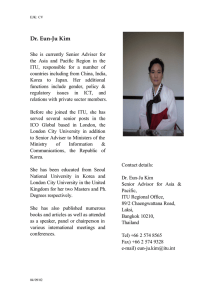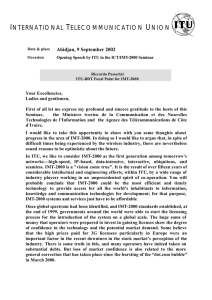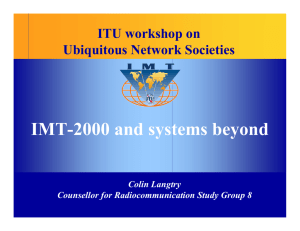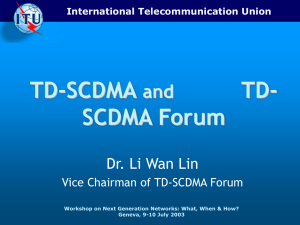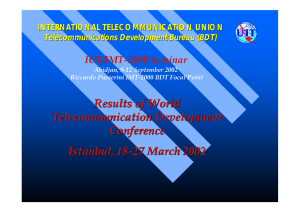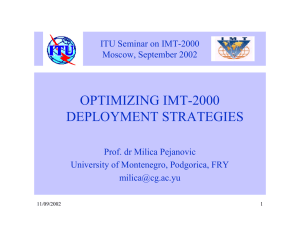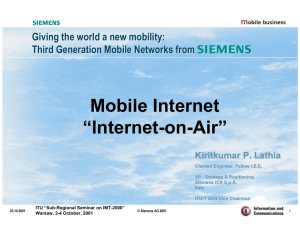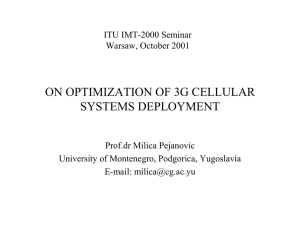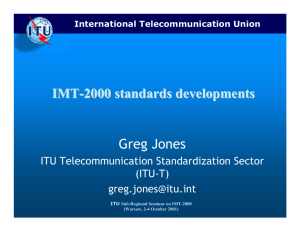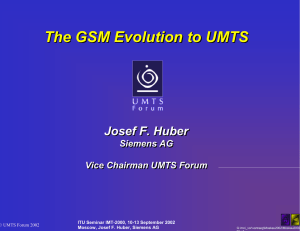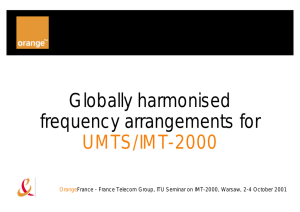ITU/MIC WORKSHOP ON SHAPING THE FUTURE MOBILE INFORMATION SOCIETY Seoul, 4-5 March 2004
advertisement
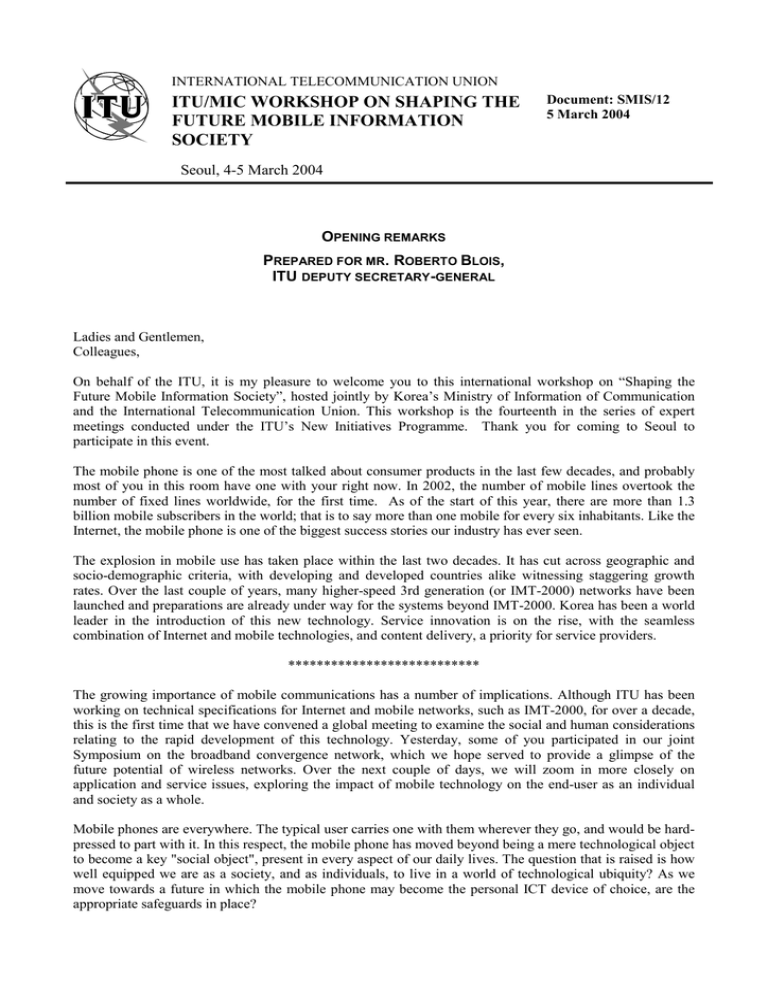
INTERNATIONAL TELECOMMUNICATION UNION ITU/MIC WORKSHOP ON SHAPING THE FUTURE MOBILE INFORMATION SOCIETY Document: SMIS/12 5 March 2004 Seoul, 4-5 March 2004 OPENING REMARKS PREPARED FOR MR. ROBERTO BLOIS, ITU DEPUTY SECRETARY-GENERAL Ladies and Gentlemen, Colleagues, On behalf of the ITU, it is my pleasure to welcome you to this international workshop on “Shaping the Future Mobile Information Society”, hosted jointly by Korea’s Ministry of Information of Communication and the International Telecommunication Union. This workshop is the fourteenth in the series of expert meetings conducted under the ITU’s New Initiatives Programme. Thank you for coming to Seoul to participate in this event. The mobile phone is one of the most talked about consumer products in the last few decades, and probably most of you in this room have one with your right now. In 2002, the number of mobile lines overtook the number of fixed lines worldwide, for the first time. As of the start of this year, there are more than 1.3 billion mobile subscribers in the world; that is to say more than one mobile for every six inhabitants. Like the Internet, the mobile phone is one of the biggest success stories our industry has ever seen. The explosion in mobile use has taken place within the last two decades. It has cut across geographic and socio-demographic criteria, with developing and developed countries alike witnessing staggering growth rates. Over the last couple of years, many higher-speed 3rd generation (or IMT-2000) networks have been launched and preparations are already under way for the systems beyond IMT-2000. Korea has been a world leader in the introduction of this new technology. Service innovation is on the rise, with the seamless combination of Internet and mobile technologies, and content delivery, a priority for service providers. *************************** The growing importance of mobile communications has a number of implications. Although ITU has been working on technical specifications for Internet and mobile networks, such as IMT-2000, for over a decade, this is the first time that we have convened a global meeting to examine the social and human considerations relating to the rapid development of this technology. Yesterday, some of you participated in our joint Symposium on the broadband convergence network, which we hope served to provide a glimpse of the future potential of wireless networks. Over the next couple of days, we will zoom in more closely on application and service issues, exploring the impact of mobile technology on the end-user as an individual and society as a whole. Mobile phones are everywhere. The typical user carries one with them wherever they go, and would be hardpressed to part with it. In this respect, the mobile phone has moved beyond being a mere technological object to become a key "social object", present in every aspect of our daily lives. The question that is raised is how well equipped we are as a society, and as individuals, to live in a world of technological ubiquity? As we move towards a future in which the mobile phone may become the personal ICT device of choice, are the appropriate safeguards in place? For example, how long should operators retain information about a users’ calls, SMS and location? Consider the use of tiny Radio Frequency ID tags imbedded into mobiles or consumer goods in general to help retail businesses track inventory: will these remain active once the item has been purchased and what kind of information will be collected? The new generation of always-on, anytime, anyplace technologies may allow for levels of convenience and safety, but also of surveillance, unknown and unimagined by earlier generations. And what of social norms? Like many ICTs, mobiles are meant to save us time. Some people argue, however, that they have also made us overly individualistic and even impolite. Have social norms evolved rapidly enough to keep pace with technological development? It is at the dawn of this new age that we must consider what effect these technologies are having on the way we grow, interact, socialize and learn. *************************** In preparing for this workshop, and to assist you with the discussion, we have prepared two background papers and a detailed website of resources on the future mobile information society. The website provides links to web-based resources from around the world, as well as country-specific information on the key themes of this workshop. We have also prepared a series of case studies in a diverse range of countries: Japan, Korea, Morocco and Norway. I hope that you have had the time to study these documents and that they will serve to enrich your discussions. What are the objectives of this Workshop? We hope that it will serve as a forum to exchange information and to benefit from international experience in the field of mobile communications and their impact on society. We hope to identify a number of key areas for further study and development, which would ensure a healthy and friendly mobile information society of the future. What is expected from you, the participants? We are looking for guidance as to how regulators, policymakers, operators, technologists, philosophers and individual citizens should respond to the challenges raised by the increasingly pervasive nature of mobile communications and devices. What key areas require international study and co-ordination? What can operators and service providers learn from the social implications of technology? How can we as a society better adapt to our rapidly evolving technological environment? I wish you a fruitful and stimulating discussion over these next couple of days on what is certainly a fascinating topic. The success of this Workshop depends on you, the participants. Please do remember that this is an informal gathering of experts - you have been invited here in an individual capacity and we hope that you will be able express your opinions freely. **************************** In order to help steer and guide our deliberations, we need a good chairman – a particularly challenging role in this multi-disciplinary setting. I would therefore like to nominate Mr. Svend Kraemer who is Head of Sector with the European Commission’s Information Society Directorate. Svend Kraemer has worked for the European Commission since 1974; prior to this, he was a lecturer at the Oslo School of Business Administration and systems programmer in the Danish computer industry; he was part of the EU negotiating team during the WTO basic telecommunications services negotiations during 1994-97 and has since contributed actively to ITU's policy forum on IP Telephony and the discussions on international Internet connectivity in ITU's study group 3. I hope you will join me in welcoming Mr. Kraemer to chair the meeting.

